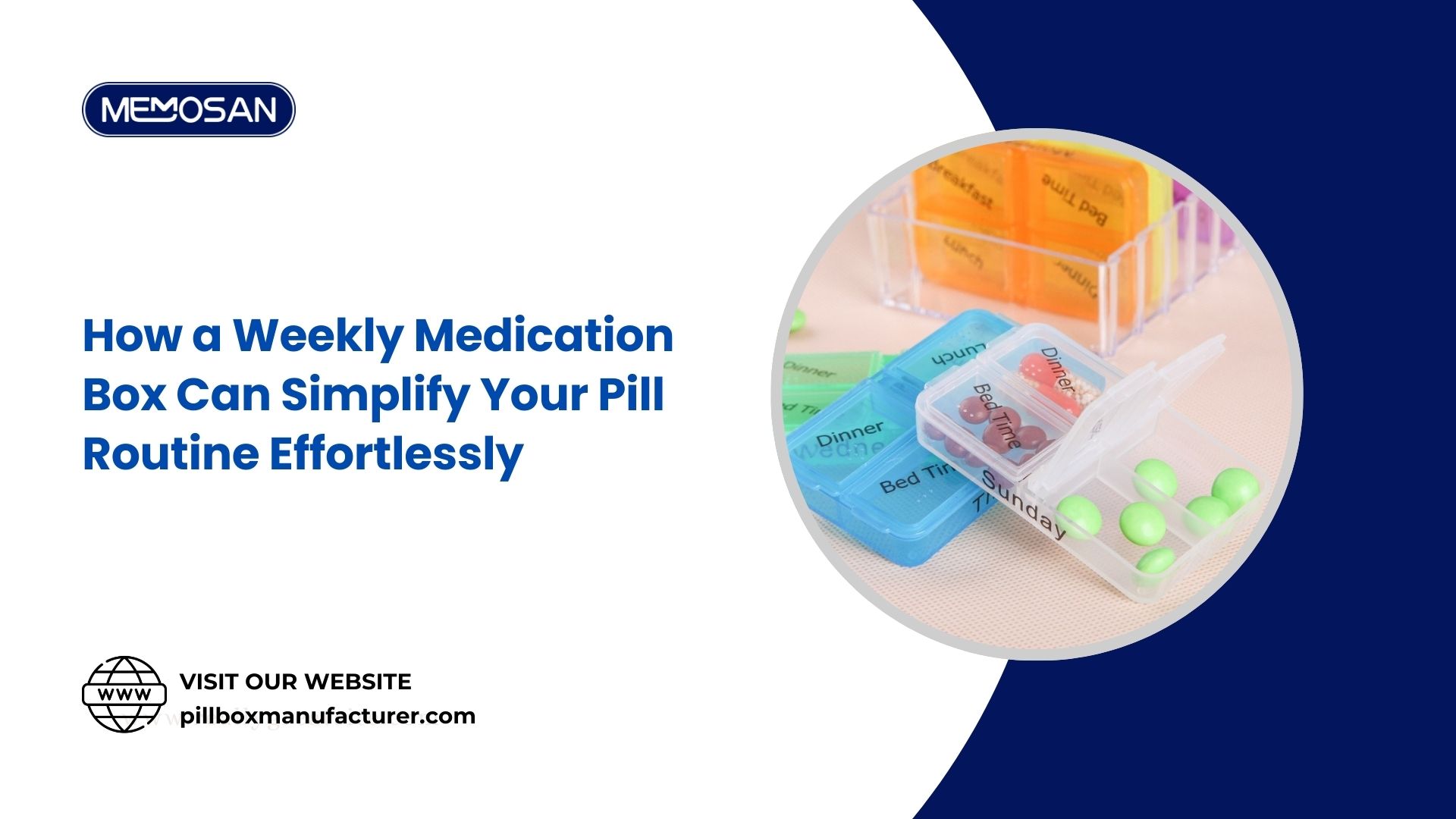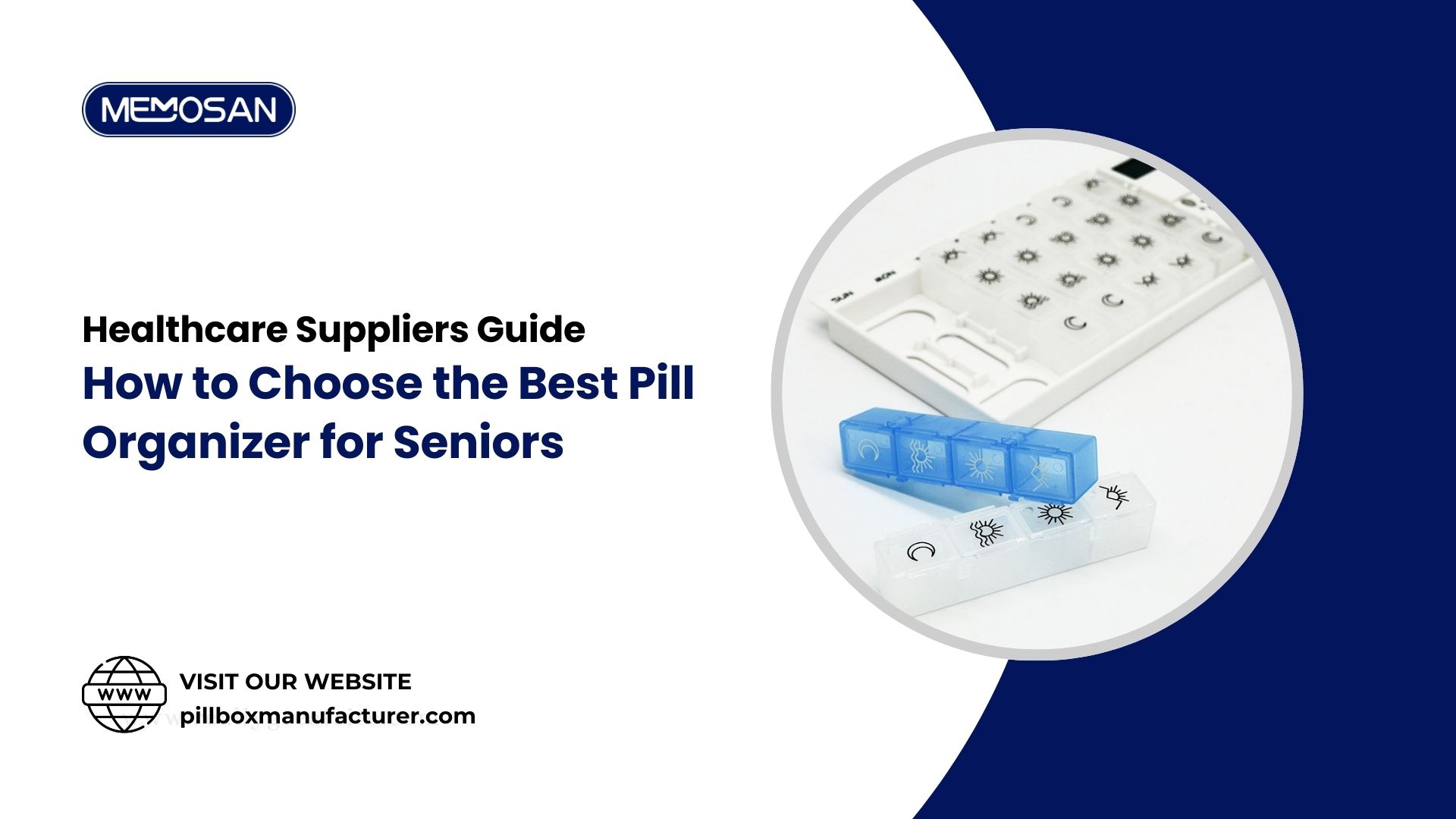In modern healthcare and daily health management, pill organizers (also known as medication storage boxes or medication organizers) have become extremely commonplace. They have evolved into an essential tool for medication reminders.
What is the purpose of a pill organizer?
A pill organizer helps people manage medications, vitamins, and supplements. By neatly sorting pills, it makes medication use more organized. It helps people remember dosages while reducing the risk of forgetting or taking medications twice.
There are many types of pill organizers available on the market today. Each serves a different purpose. They each have their own advantages, but also certain limitations. Below, we will introduce five common types of pill organizers and list their pros and cons. This will help you better choose the pill organizer that best suits your needs.
Types of Medicine Boxes
1. Plastic pill box
Plastic pill boxes are the most widely used type. They are typically made from acrylonitrile butadiene styrene (ABS) or polypropylene (PP). Many models feature transparent or translucent designs for easy viewing of stored medications.
Advantages:
Affordable for everyone.
Lightweight and portable, ideal for daily carry.
Transparent design allows easy monitoring of medication status.
Variety of styles, including monthly pill organizers, weekly pill boxes, and daily pill cases.
Disadvantages:
Less durable than metal or glass pill organizers, requiring replacement after extended use.
May deform in high-temperature environments.
Prone to scratches or stains with prolonged use.
Inferior sealing performance compared to metal pill organizers.
2. Metal Pill Box - Aluminum Alloy Pill Box
Aluminum alloy pill boxes represent a premium choice, often favored for their durability and stylish design. Crafted from high-quality aluminum alloy, their surfaces typically undergo processes like spraying, silk-screening, or water transfer printing, resulting in an exquisite appearance and distinctive texture.
Advantages:
– Sturdy and durable with a long service life.
– Effectively shields pills from moisture, sunlight, and air exposure.
– Elegant appearance, suitable as a travel pill case or gift.
Disadvantages:
– Higher production costs, resulting in a price premium over plastic pill cases.
– Significantly heavier than plastic pill cases, making them unsuitable for pocket carry.
– May develop scratches or discoloration with prolonged use.
3. Glass pill box
Glass pill boxes are uncommon, characterized primarily by high transparency and often used for storing premium or specialized medications. Individuals rarely purchase glass pill boxes on their own.
Advantages:
Heat-resistant and chemically stable, preventing reactions with medications or health supplements.
Strong sealing properties.
Elegant appearance with a translucent, premium feel.
Disadvantages:
Fragile and requires careful handling, especially around children.
Heavier than plastic or aluminum pill boxes, making them less convenient for carrying.
Higher cost and more complex manufacturing process.
4. Wooden Medicine Box
Wooden medicine boxes are better suited for those who value quality, collectibles, and traditional cultural ambiance, particularly in scenarios involving Chinese herbal medicine and traditional Chinese wellness practices. However, if emphasis is placed on portability, low cost, and ease of mass production, plastic or paper medicine boxes may be more appropriate.
Advantages
Aesthetically pleasing and elegant, with natural wood grain patterns offering a rustic and warm texture. As medicine boxes, they serve both practical and decorative purposes, particularly suited for traditional Chinese medicine or wellness products.
Environmentally friendly and healthy, as wood is a natural material more sustainable than plastic or metal. When finished with non-toxic coatings or sanding techniques, they enhance pharmaceutical safety.
Structural Durability
Wooden boxes are typically robust, offering superior compression resistance and resistance to deformation compared to paper packaging.
Ideal for long-term storage of herbal medicines, pills, or tea products.
High Customizability
Can be carved, perforated, lacquered, or branded with patterns to enhance cultural and collectible value.
Disadvantages
Heavier than plastic or paper boxes, making them less portable.
Significantly affected by environmental conditions. Prone to moisture damage, mold growth, or cracking—especially in humid settings—requiring careful moisture protection and maintenance.
Higher cost due to wood materials and complex manufacturing processes compared to standard plastic or paper boxes.
High maintenance demands. Long-term use requires regular wiping, protection from direct sunlight and moisture exposure to prevent mold or deformation.
6. Electronic Pill Organizer
An electronic pill organizer is a smart medication dispenser typically equipped with timed reminder functions. Some models also support Bluetooth or Wi-Fi connectivity, syncing with mobile apps to help users scientifically manage their medication.
Advantages:
Built-in alarm or reminder function prevents missed doses.
Some models allow medication history tracking via app.
Ideal for seniors, chronic disease patients, and those requiring long-term medication.
Premium models offer voice alerts and remote monitoring for enhanced intelligence.
Disadvantages:
Higher cost compared to traditional pill organizers.
Requires batteries or charging, resulting in slightly higher maintenance costs.
May present a learning curve for seniors unfamiliar with electronic devices.
In addition to pill organizers, pill cutters and grinders are also essential tools that many people use alongside pill organizers, especially for elderly individuals or chronic disease patients who need to take medication in divided doses.
7. Pill Cutter
A pill cutter is a compact tool designed to split tablets into halves or smaller doses. It serves as a valuable aid for users who need to divide their medication.
Advantages:
Effortlessly cuts tablets into equal pieces, ensuring precise dosing.
Simple operation with higher safety than using knives or scissors.
Compact size for easy portability.
Affordable price, ideal for household use.
Disadvantages:
Only suitable for solid tablets; ineffective on capsules or softgels.
Blades on some inexpensive models may dull quickly.
Tablets may crumble after cutting, making it unsuitable for all medications.
Conclusion: Which Pill Box Should You Choose?
From plastic pill organizers for daily use, to aluminum pill boxes for travel, and even ceramic or glass pill cases for special occasions, each type has unique benefits.
If you need the best weekly pill case for seniors or an affordable daily pill organizer → plastic pill boxes are the top choice.
If you want a travel-friendly medicine organizer with a premium design → aluminum or metal pill boxes are excellent options.
For collectors or elegant gifts → ceramic and glass pill boxes stand out, though they are less portable.
When selecting a pill organizer, consider your lifestyle, budget, and medication routine. Choosing the right pill box not only improves medication management but also brings peace of mind to your daily health care.



